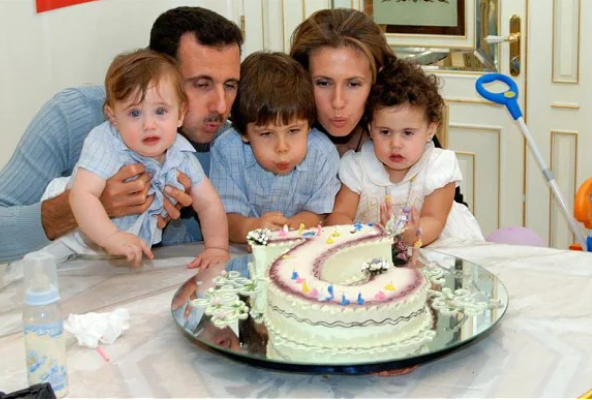Virendra Pandit
New Delhi: For a former medical practitioner Bashar al-Assad, the ophthalmologist-turned- Syrian dictator, it may be a double whammy. He not only lost power and pelf in Damascus two weeks ago, and fled to Russia for asylum, he may now lose even his family: his wife of 24 years has filed for divorce and wants to return to the United Kingdom along with children.
Russia, however, denied these reports.
According to the media reports, the former First Lady of Syria, Asma al-Assad, is unhappy with her severely restricted life in Moscow, where the Assads are currently living in exile.
Born in London in 1975 to Syrian-origin parents, she holds dual British-Syrian citizenship, which gave her hope that she could relocate permanently to the UK along with her three children.
The couple has three children: Hafez, Zein, and Karim.
The Jerusalem Post, quoting Turkish and Arab media sources, said Asma al-Assad, wife of deposed Syrian President Bashar al-Assad, has filed for divorce and desired to return to the United Kingdom. She reportedly applied to a Russian court seeking divorce from her husband and special permission to leave the country. Her request is currently under review by Russian authorities.
Asma completed degrees in computer science and French literature at King’s College London before pursuing a career in investment banking. She married Dr. Bashar al-Assad in December 2000.
In the 1980s, Assad became a doctor, and in the early 1990s, trained in London as an ophthalmologist. In 1994, after his elder brother, Bassel al-Assad, died in a car crash, his father, then Syrian President Hafez al-Assad, recalled him to take over as heir apparent.
Now in Moscow, the Assads face severe restrictions imposed by the Russian authorities. Although his asylum request has been accepted, Bashar is prohibited from leaving Moscow or engaging in political activities. Russia has also frozen his assets, including 270 kilograms of gold, USD 2 billion in cash, and 18 properties in Moscow, the media reported.
The al-Assad dynasty, which ruled Syria with an iron hand and brutal methods, for more than five decades, has seen its control quickly unravel in the country. In early December, Sunni terrorists breached the capital, Damascus, forcing the al-Assads to flee and effectively end the family’s grip on power.
For decades, a predominantly Sunni-dominated Syria remained part of Shia Iran’s “axis of resistance” against Israel. The Assads followed a Shia subsect, the Alawites, and crushed the Sunnis when their rule began in 1970 under Hafez al-Assad, who usurped power through a military coup and consolidated his grip with Iran’s support thereafter.
Bashar al-Assad’s highly unpopular reign relied heavily on a tightly-knit “inner circle,” chiefly comprising family members and friends who held key positions of influence and power.
Bashar’s younger brother, Maher al-Assad, as the Commander of Syria’s Republican Guard and the 4th Armoured Division, oversaw military operations and maintained an alliance with Iran. He also controlled the Shabiha militia, a group notorious for protecting regime interests through violent means. Maher was sanctioned by the European Union for his role in the suppression of protesters and was linked to the 2005 assassination of Lebanese Prime Minister Rafik Hariri.
Bushra al-Assad, Bashar’s only sister, was her brother’s secretary and married General Asef Shawkat, a key military figure, in 1995. Bushra reportedly clashed with Asma over the latter’s public prominence, preferring to keep the “First Lady” title associated with her mother, Anisa.
Rami Makhlouf, a first cousin of Bashar, controlled a significant portion of Syria’s economy. With interests in telecommunications, retail, and energy, he was Syria’s wealthiest man, the media reported.

